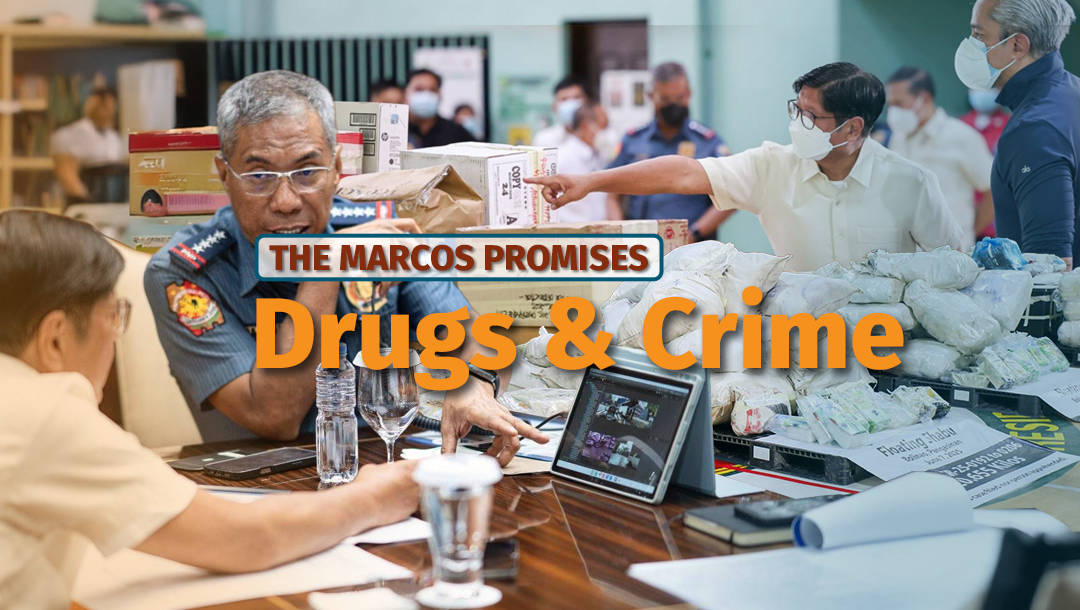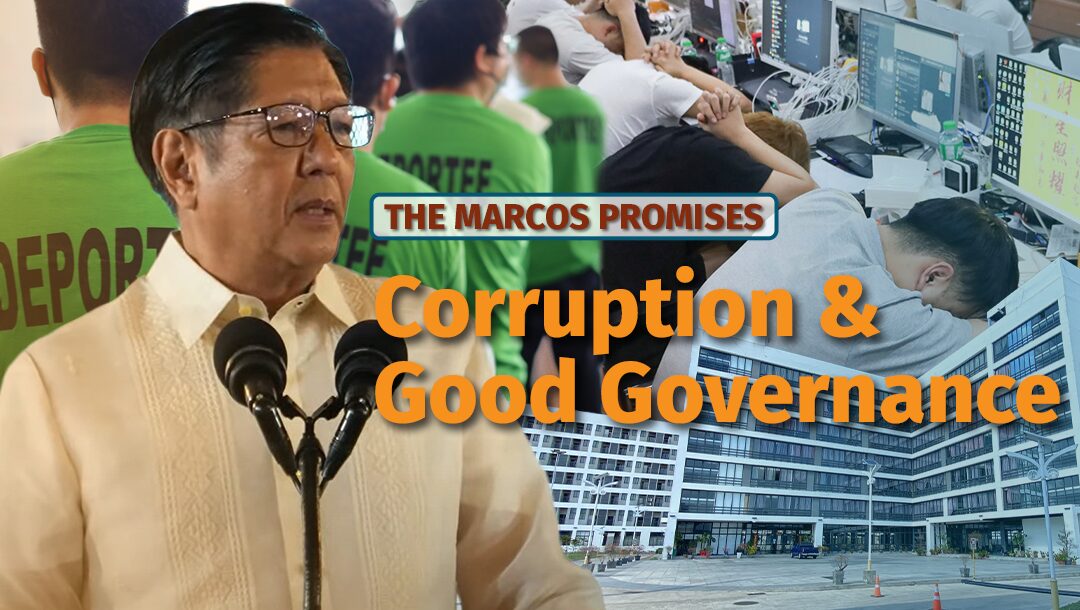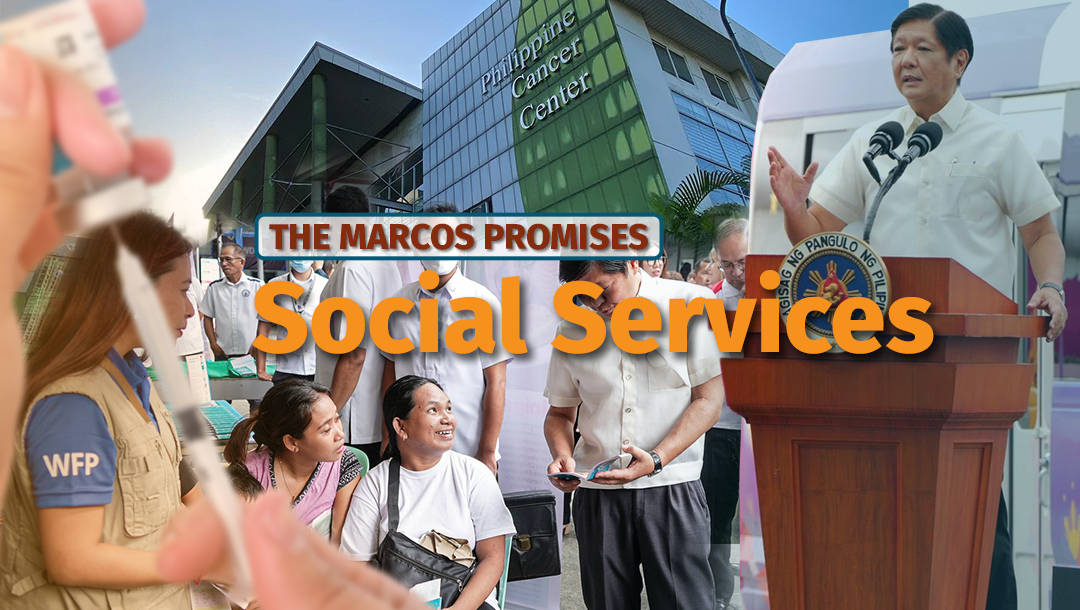Midway through his six-year term, President Ferdinand Marcos Jr. acknowledged, “We still have a drug problem in this country.” Days later, he inspected illegal drugs worth P8.87 billion confiscated during recent police operations.
In the same week, the president witnessed the destruction of illegal drugs with an estimated street value of more than P9.4 billion at a waste management facility in Capas, Tarlac.
Part of the haul destroyed through thermal decomposition were the 1,304 kilograms of shabu, much of which were recovered floating in the coastal waters of Zambales, Pangasinan, Ilocos Norte, Ilocos Sur and Cagayan. No person was apprehended and no criminal case was filed involving the “floating” shabu.
“We must continue the war against drugs but… we do it in a peaceful way,” Marcos said after taking a look at the bundles of recovered illegal drugs stored at the Philippine Drug Enforcement Agency headquarters in Quezon City on June 24.
This was a mere reiteration of his 2022 declared policy to continue the fight against narcotics, which, he said, “has taken on a new face,” focusing more on community-based treatment, rehabilitation and reintegration of drug-dependent users – a huge turnaround from his predecessor’s bloody war against illegal drugs.
“It has been described as a bloodless war on drugs and that is what we are aiming for. Nonetheless, despite the fact that we do not kill people that are just suspected of having anything to do with drugs, imbes na ganon ang ginagawa natin (instead of doing it that way), we are handling the drug problem in a different way,” he said after inspecting the shabu haul.
Marcos did not say anything about the drug war in his first State of the Nation Address in July 2022 nor was there any mention about human rights in his speech that lasted 74 minutes. The following year, he declared: “We will relentlessly continue our fight against drug syndicates, shutting down their illegal activities – we will shut down their activities and dismantle their network of operations.”
In his 2024 SONA, Marcos restated his “bloodless” fight against illegal drugs. “Our bloodless war on dangerous drugs adheres, and will continue to adhere, to the established ‘8 Es’ of an effective anti-illegal drugs strategy. Extermination was never one of them,” he said.
1, 009 drug-related deaths in Marcos’ first three years
However, the Dahas Project of the University of the Philippines’ Third World Studies Center documented 362 drug-related killings in the second year of Marcos’ administration, from July 1, 2023 to June 30, 2024, exceeding the 342 killings reported in the previous year. Its report said state agents were responsible for 34% of the killings.
As of July 7, Dahas Project’s latest numbers show 1,009 drug-related killings recorded during the first three years of the Marcos administration.
Debunking the claims of a “bloodless” anti-narcotics campaign under the present dispensation, Dahas Project’s 2023 report showed a much higher number of drug-related deaths in the first six months of the Marcos administration (July to December) with 175, compared to 149 killings in the last six months of Duterte’s presidency (January to June). It also documented more casualties in 2023 (331) than in 2022 (324).
Read: The 2023 Dahas Report: The casualties of Marcos’ ‘bloodless’ drug war
But data from PDEA showed a much lower number of drug-related deaths in the last three years—271 drug personalities killed in operations, or less than 5% of the 6,259 PNP-recognized slain suspects during the six years of the previous administration.
The number of government-recorded deaths in the course of Duterte’s brutal drug war was way below the 30,000 killings estimated by human rights groups.
Duterte has been detained at The Hague, Netherlands since March 12 as he awaits trial for crimes against humanity before the International Criminal Court in connection to the drug-related killings during his presidency.
Dismantling syndicates a big challenge
In the pilot episode of BBM Podcast aired last May 19, Marcos said large shipments of illegal drugs have been intercepted lately because big warehouses were targeted. However, dismantling the syndicates has been a challenge. “Dahil ang sindikato kasama na diyan ‘yung police, kasama na diyan ‘yung local government. Laking pera, eh. Ang laking pera talaga nila. Ang dami nilang pera (Because the syndicates include the police, the local government. It’s big money. They really have big money. They have so much money), the chief executive lamented.
He said even judges and prosecutors have been coerced to protect the interests of drug syndicates. “Walang panama ‘yung suweldo nila sa gobyerno doon sa binibigay nung mga sindikato. Kaya’t ‘yun ang binubuwag namin (Their pay in government is no match for what the syndicates give them. That’s what we’re dismantling).”
Nevertheless, Marcos directed the PDEA and the Philippine National Police to ensure the integrity of all anti-drug operations – from buy-busts to the proper disposal of seized narcotics – while intensifying efforts to curb the spread of illegal drugs in communities.
The latest PDEA report submitted to the president shows a total of P82.58 billion worth of illegal drugs, including the 1,304 kilograms of shabu found floating in the coastal waters in Northern Luzon, seized between July 1, 2022 and June 25 this year.
The confiscated drugs include 11,039.31 kilos of methamphetamine hydrochloride or shabu worth P75.07 billion, 94.08 kilos of cocaine worth P498.62 million, and 140,067 pieces of the party drug methylenedioxymethamphetamine or ecstasy worth P238.11 million.
In terms of value, the P82.58 billion worth of drugs seized in the first half of the Maros administration already comes close to the P91.06 billion worth of narcotics confiscated during the full term of the Duterte presidency, from July 1, 2016, to June 30, 2022.
Marcos viewed these numbers as indications of success of what he deems as a “bloodless” drug war. “The new concept of the war against drugs is working. So, we will continue down that vein. And I think we are beginning to see the good effects of that new policy,” he said in a media briefing on June 24.
While pursuing the syndicates, Marcos said, law enforcers should also go after small-scale drug dealers, and make sure they strictly uphold due process in their anti-drug operations. This way, he said, the government is hitting the drug trade at the highest level and at the lowest level.
‘Not enough’ that crime rate is down
In the second episode of BBM Podcast aired on June 18, the president said: “It’s not sufficient that you are safe. You must feel safe.”
“Even if the statistics are telling you crime rate is down, drug seizures are up, that’s not enough. People should feel comfortable to walk in the night around their neighborhood… that they can send their child to the sari-sari store. ‘Yun ang kailangan kaya ginawa namin (That’s what we need and that’s what we’re working on),” he continued, citing the efforts of Gen. Nicolas Torre III, the new director general of the Philippine National Police, in strengthening police visibility on the streets and quick-response time.
Marcos hailed Torre’s “Cops on the Beat” program, which has been credited for the 22.53% reduction in the reported crime incidents to 14,162 from Jan. 1 to June 13 this year from 18,280 during the same period last year.
Last June 18, Marcos said he has ordered the PNP and the Philippine Coast Guard to intensify security at all major drug entry points and ensure that confiscated narcotics are destroyed immediately to prevent them from reentering the streets.
Check out the status of Marcos’ promises related to drugs and crime:







